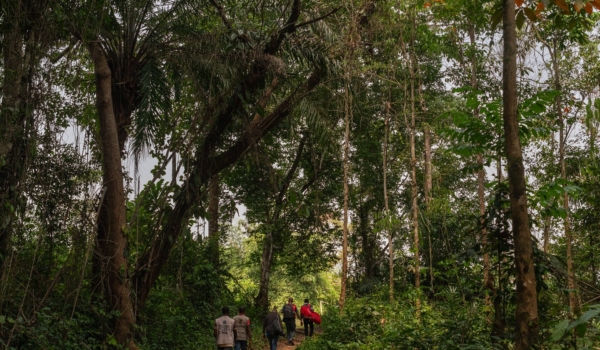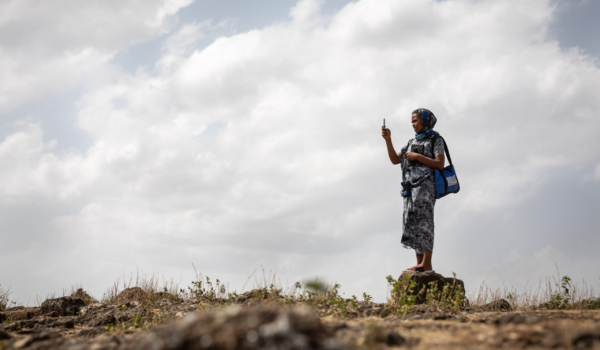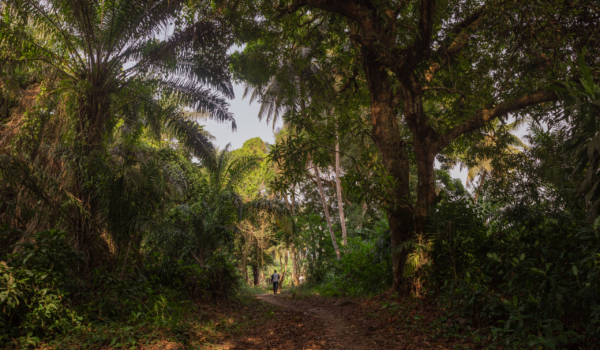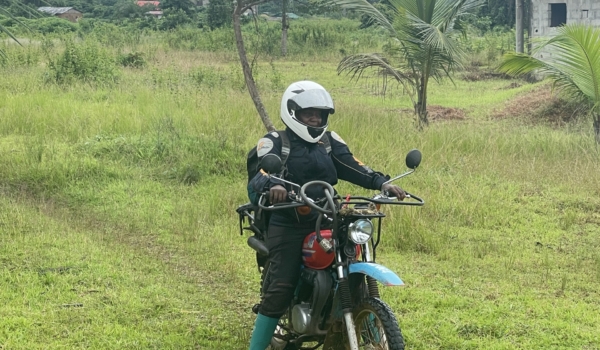On a sunny morning, Ruth David walks from house to house in Goga Community, Liberia to visit her neighbors.
At one house, she speaks to a pregnant woman about the importance of prenatal care. Citing her own pregnancy experience with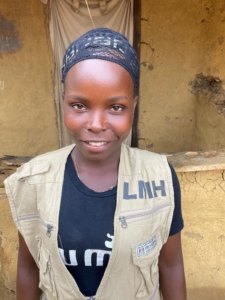 her one-year-old daughter Decontee, she helps the woman plan to have at least four check-ups at the nearest clinic before giving birth. At another house, she administers artemisinin-based combination therapy (ACT) to a child under five who was diagnosed with malaria. If the patient doesn’t recover quickly, she’ll refer them to the nearest health facility for advanced care with the support of her supervisor, Isaac Gardea, who is a trained nurse.
her one-year-old daughter Decontee, she helps the woman plan to have at least four check-ups at the nearest clinic before giving birth. At another house, she administers artemisinin-based combination therapy (ACT) to a child under five who was diagnosed with malaria. If the patient doesn’t recover quickly, she’ll refer them to the nearest health facility for advanced care with the support of her supervisor, Isaac Gardea, who is a trained nurse.
As a community health worker, this is her daily routine. With the nearest health facility up to a four hours walk away, Ruth is the only link between patients living in remote communities like Gogo and Liberia’s health system.
But this critical link only exists because of a historic investment in community health workers by the Government of Liberia. Launched after the Ebola outbreak in 2016, the National Community Health Assistant Program is working to recruit a paid community health worker for every rural and remote community in the country.
Prior to the national program, Ruth and her neighbors could not access essential health services due to distance. Pregnant women couldn’t afford the trip to the nearest facility so they often went without prenatal care and gave birth at home, and parents had to rely on medication bought during market day to care for their sick children.
Ruth explains that the impact was devastating, as ‘’the deaths of pregnant women during delivery were very high, and children used to die from common things like malaria.”
Ruth had been working as a farmer and selling produce on market days, but she wanted to be part of the solution. She was recruited to become a community health worker in 2018, when the national program expanded to Grand Bassa County with the support of Last Mile Health. She was trained to provide essential primary care and equipped with tools like medication and a smartphone. She now receives weekly supervision from Isaac, and is paid for her work.
The success of this new model of care required building trust with her neighbors. “At first, they said I was giving them hard times by coming everyday but they now even come to see me when their children are running temperatures.”
Ruth has witnessed the incredible impact of the program, saying, “The way of living in the community has changed because of my work.”
And she’s not alone — community health workers like her now serve over 15% of Liberia’s total population, reaching more than 800,000 people. They have conducted 6.3 million home visits and delivered over 1.8 million treatments and malnutrition screenings to children under five since 2016.
Borne out of one crisis, Liberia’s national community health worker program is now being tested by another: the COVID-19 pandemic.
Ruth was trained in COVID-19 response in 2020, and since then she has consistently raised awareness about the virus and worked to ensure that community members are adhering to preventive measures. “The people in the rural areas need to know about COVID-19 and it is through us, the community health workers.” Ruth explained, “There is hardly any radio or internet coverage here, so everything is done by word of mouth.”
In partnership with the town chief, who is the community leader, they have urged neighbors to wash their hands, social distance, and wear masks. Ruth has also advocated for community members to get vaccinated against COVID-19. Drawing on the trust she’s built with the community and her experience getting both doses of the vaccine, she has assured community members that it is safe and effective. “I am fully vaccinated,” she said. “I feel very safe even though I still wash my hands and wear my mask. I know that even If I do come down with COVID-19, my symptoms will be mild… I can even talk to my community about how the vaccine is safe.”
Looking to the future, Ruth hopes that the partnership between community health workers and their neighbors can foster increased trust, encourage healthy behaviors, and advance equal access to care and fair treatment. The perseverance of her community during the COVID-19 pandemic makes her hopeful that her hopes for the future can be realized. “The most rewarding part of my job is to see my people willing to go to the clinic and there is no death from birth. Even [during] COVID-19, they are preventing and washing their hands. Everyone is involved in the health business.”

